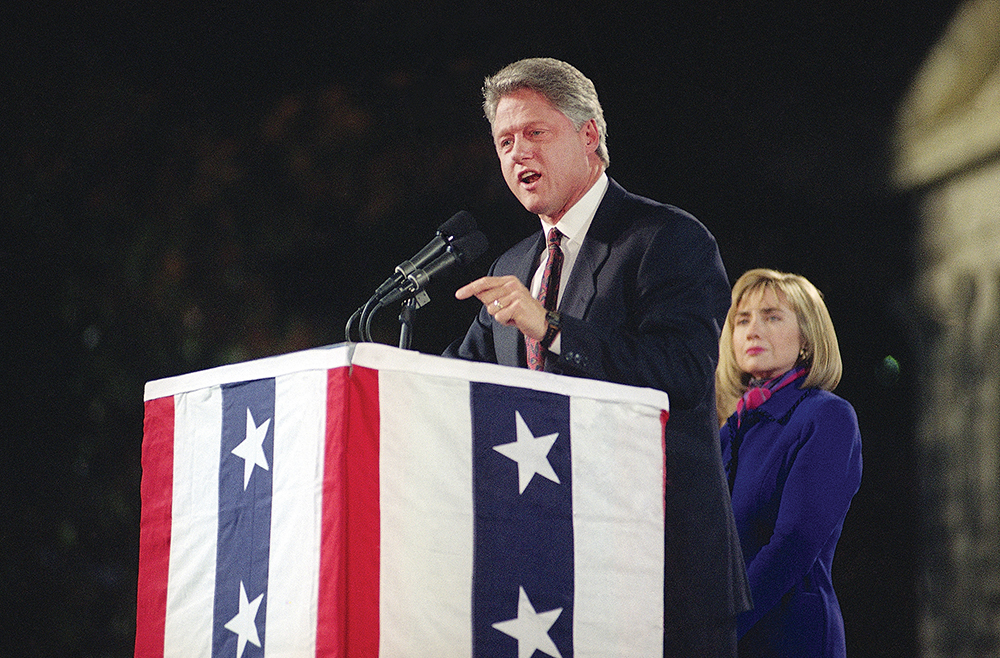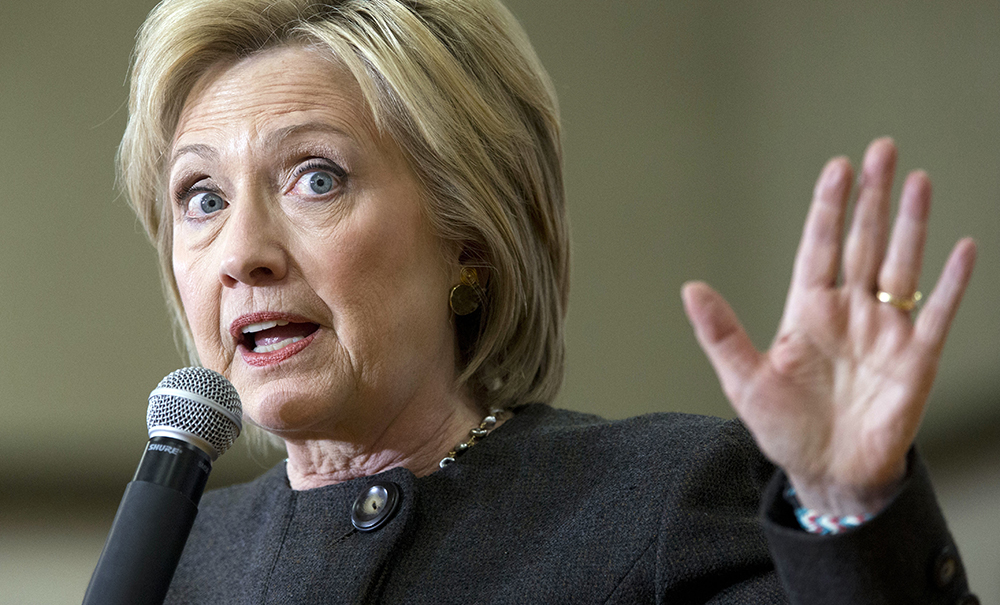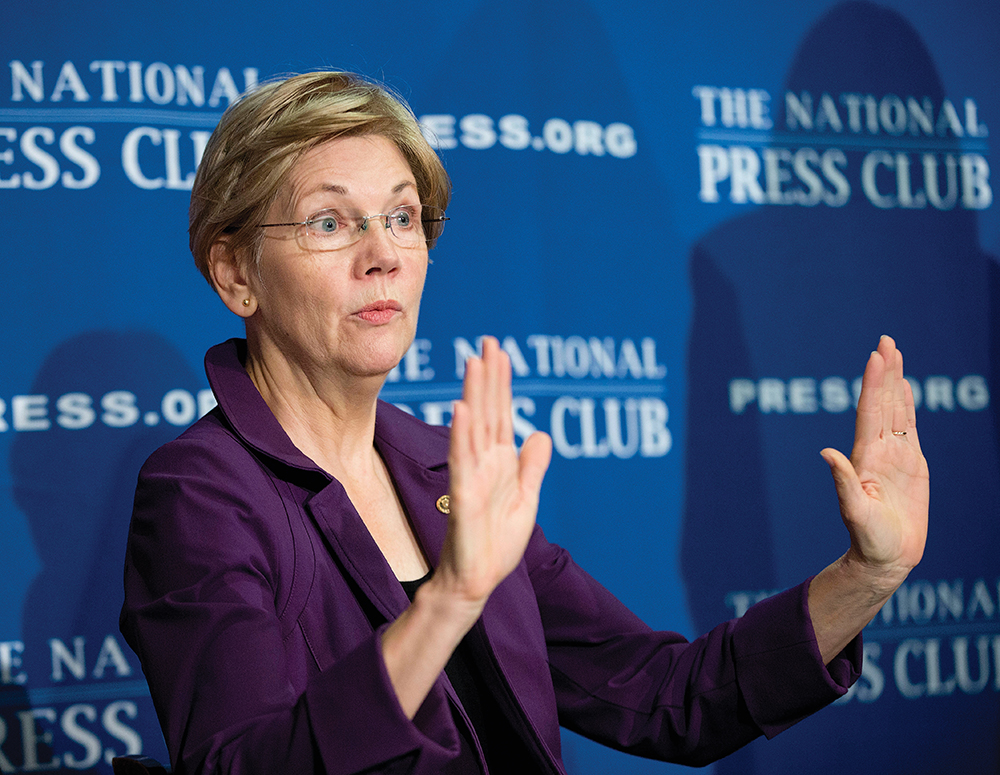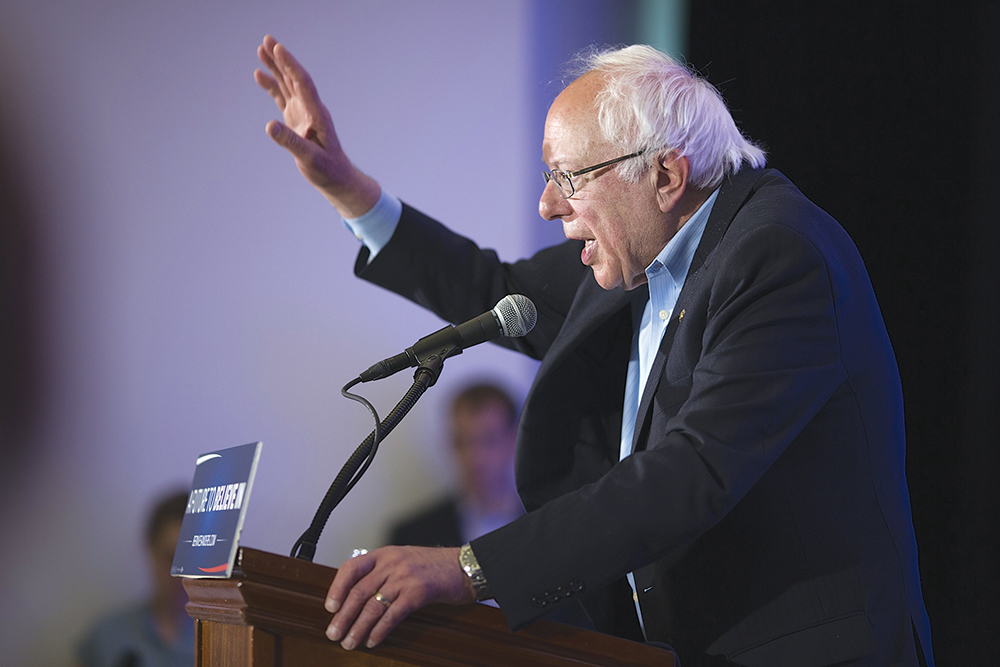Hillary Clinton appears positioned to wage a general election campaign with the support of both Wall Street and the most aggressive populist critics of the banking industry, even if both sides may have reservations about her.
Clinton, long viewed as a Democrat friendly to Big Business, has endorsed enough far-reaching reforms of Wall Street during her bruising primary with Vermont Sen. Bernie Sanders to assuage the concerns of many of the hardcore big bank opponents who have been ascendant in the party.
As the November elections approach, Clinton looks better to liberals compared with Republicans who have vowed to repeal the Wall Street reform law passed by President Obama, undoing the work of Democrats over the past eight years.
Meanwhile, bankers who once hoped for a President Jeb Bush or President Marco Rubio have begun to reluctantly back her as the responsible alternative to Donald Trump and a better option than Sanders.
Clinton Changed
“When I read Secretary Clinton’s plan and follow up on the details and pay attention to those, I think that is substantially in the same place that Bernie Sanders would be able to go with his proposals,” said Simon Johnson, a Massachusetts Institute of Technology finance professor and author of the book 13 Bankers that analyzed the causes of the financial crisis and placed a priority on curbing big banks’ influence over policy.
That, in 2016, Clinton would be lumped in by a top financial reform advocate with a pure populist such as Sanders would have been a surprise in the 2008 Democratic primary, the 2000 New York Senate race or any of Clinton’s other times in the political spotlight.
Since the days of her husband’s administration, the former secretary of state has been perceived by many on the Left as friendly to the big banks and their goals in Washington.
After all, it was Bill Clinton who signed financial deregulation measures that many on the Left later blamed for the 2008 financial crisis, including an official repeal of the Depression-Era Glass-Steagall separation of commercial banks from investment banks.
Perhaps even more importantly, it was Bill who chose Robert Rubin, the former Goldman Sachs banker, as Treasury secretary.
Rubin and his Treasury proteges who went on to serve in top financial regulatory positions in the Clinton and Obama administrations represent a nexus between Wall Street and the Democratic Party that liberal populists such as Sanders and Massachusetts Sen. Elizabeth Warren have sought to break.
During this year’s Democratic primary, the first since the financial crisis, the Warrens and the Sanders of the party have demonstrated their increased influence.
Clinton has sought to portray herself as one of them. Since the early days of the primary, she has boasted that, as a senator for New York, she went to the Nasdaq stock exchange, a symbolic choice of venue, during the height of the mortgage crisis and told Wall Street to “cut it out.”

It was Bill Clinton who signed financial deregulation measures that many on the Left later blamed for the 2008 financial crisis. (AP Photo)
It was a tough case for her to make.
The Nasdaq speech she has touted included little in the way of an actual rebuke to bankers. And Clinton’s record as senator at the time shows her suggesting only minor, ad hoc measures to alleviate the mortgage crisis that did not earn support in the Senate. Furthermore, banking reform was almost a non-issue in the 2008 Democratic primary debates and on the campaign trail. In that election cycle, the financial services industry gave her campaign $7.3 million.
More convincing, Sanders has claimed in the primaries, are Clinton’s associations with high-profile banks during her time in the private sector after leaving the State Department.
During that period, Clinton received six-figure payouts to speak to banks such as Goldman Sachs and Morgan Stanley. Altogether, she personally received at least $1.8 million in speaking fees from eight big banks, according to CNN.
With the funding Clinton has received from the financial industry, the speaking fees have been a major line of attack for Sanders throughout the contest.
“Why in God’s name does Wall Street make huge campaign contributions?” Sanders asked sarcastically during one debate. “I guess just for the fun of it — they want to throw money around!”
Closing the gap
Whatever her background, Clinton has successfully closed the gap between her and Sanders on financial regulation, from the vantage point of many of the liberals who have pushed for Democrats to stake out progressive platform planks.
She did so by rolling out a long list of stringent regulations that she would impose if she had her way.
At the top of the list is a threat to break up big banks. If regulators determine that banks are so big that they are a threat to the financial system, she has said, she will support them in breaking up the companies using their existing powers and will seek new legislation to make doing so easier.
She has proposed a “risk fee,” essentially a tax on banks above a certain size, increasing for bigger banks that rely more on debt for their financing.
Added to that would be a financial transactions tax aimed at slowing high-frequency trading and a bolstered “Volcker Rule,” the complex regulation included in the 2010 Dodd-Frank law that limits the ability of banks with deposits insured by the government to engage in speculative trading.
While ambitious, Clinton’s sketched-out agenda is not as straightforward as Sanders’. The Vermont senator has called for simply breaking up big banks and imposing an updated version of Glass-Steagall that would radically simplify them.
Nevertheless, Clinton’s agenda includes far-reaching new government intervention into areas that Sanders has not explicitly addressed.
In particular, she has proposed a raft of rules on what economists call “shadow banking,” the financial companies that conduct bank-like activities but are outside the regulatory perimeter, meaning that they are not regulated like banks and do not have access to the safety net of insured deposits or emergency loans from the Federal Reserve.
Hedge funds, investment banks, mutual funds and other “shadow banks” would face new rules under Clinton’s plan, ranging from requirements that they pony up more cash in trades to greater mandated disclosures.

Hillary Clinton has successfully closed the gap between her and Sanders on financial regulation. (AP Photo)
Clinton has argued that her shadow banking proposals are tougher than any of Sanders’ ideas, because it was non-banks such as investment bank Lehman Bros. and insurer American International Group that collapsed in 2008 and threatened to bring down the economy with them, not the biggest banks.
Some economists have criticized Clinton’s platform as one meant to sound as though it would be tough on banks while really being designed to avoid any of the genuinely disruptive steps that Sanders has endorsed.
But for many of the most proven financial reformers with whom a prospective President Clinton would work, she has demonstrated that she is on the same page as Sanders and others on the Left.
“They talked actual substance and issues,” said Sen. Sherrod Brown of Ohio, the top Democrat on the Senate Banking Committee. “Sen. Sanders talked about breaking up the banks. Secretary Clinton talked about better regulation of shadow banking, of the non-bank financial sector.”
“I liked what they both said” during the primary, said Brown, known as one of the lawmakers most aggressive in pushing oversight of Wall Street. “They’re both generally right on this.”
“There’s no daylight on the basic premise that there should be no bank too big to fail and no individual too powerful to jail,” Clinton said during a January debate. “We agree on that.”
She appeases populists with plans to reform Wall Street, but big banks begrudgingly support her, too.
Too big to jail
Part of that comment — the commitment that no one would be above jail time — has gone a long way toward allaying liberals’ concerns about Clinton.
Rules and regulations are useless without enforcement, and for that you need aggressive regulators and prosecutors, Warren and her allies have argued.
The “No. 1 ask” of presidential candidates was that they pledge to staff the executive branch with hawkish enforcers, said Adam Green, co-founder of the Progressive Change Campaign Committee. The committee, which has not endorsed a candidate, is an outside group aligned with Warren that backs economic populist policies and has rallied members to push the candidates toward bolder financial reform measures.
“Do we have a captured SEC or a very pro-enforcement SEC?” asked Green, referring to the Securities and Exchange Commission tasked with overseeing markets. “Do we have an attorney general who will criminally prosecute Wall Street bankers or give them a pass like they did in 2008?”
On paper, Clinton has pledged tougher consequences for fraud and financial misdeeds through a number of means, including prosecuting individual bankers for breaking the law or for crimes committed by their underlings that they failed to stop. She has said that fines should hit the pay of bankers rather than being borne by investors.
In the aftermath of the subprime mortgage crisis, the Obama administration has prosecuted banks for mortgage fraud, extracting more than $200 billion in fines from banks as part of settlements related to the crisis, according to investment bank Keefe, Bruyette & Woods.

Rules and regulations are useless without enforcement, and for that you need aggressive regulators and prosecutors, Massachusetts Sen. Elizabeth Warren and her allies have argued. (AP Photo)
Most recently, in April, the Justice Department announced a settlement with Goldman Sachs for more than $5 billion for the bank’s pre-crisis sales of mortgage-backed securities.
Yet there is less to those settlements than it would appear from the dollar figures touted by the administration.
Many of the settlements have required banks to direct money toward consumer relief, which in some cases has meant making loans to distressed communities. Many funds have turned out to be tax-deductible for banks. And the fine amounts have fallen far short of what would be needed to deter companies from the profitable activities that got them into legal trouble in the first place, critics say.
In other words, banks are able to chalk up the fines as a cost of doing business. The Department of Justice gets to declare success, while bank executives keep on doing what they’ve been doing. A prime example is that of Jamie Dimon, the JPMorgan Chase CEO who received an $18.5 million bonus in 2014 after his company paid out $23 billion in fines and settlements in 2013.
Cases like that are the reason that Warren and others have pushed hard for prosecutors to go after individuals and not to settle with companies. “If CEOs know they won’t ever be criminally prosecuted, and if companies know they won’t ever be brought to civil trial, and will always get a settlement,” Green said, “the incentives are to defraud the public, reap massive gains and pay slap-on-the-wrist penalties.”
The Obama administration has responded to the criticism that Wall Street executives have not been prosecuted for the crisis by arguing that there simply were not cases to be made at that level.
“You sometimes look at these cases and you see that things were done wrong. And then the question is whether or not they were illegal,” then-Attorney General Eric Holder said in a March 2013 hearing. At that same hearing, he laid out concerns about legal actions against institutions if prosecuting them could hurt the broader economy, a statement that was criticized as an admission that some companies can be “too big to jail.”
Last year, at a press event toward the end of his tenure, Holder said that Justice attorneys “live for these big cases. The inability to make them at least to this point has not been as a result of a lack of effort.”
That explanation — that what the bankers did wasn’t illegal even if it was wrong — has not satisfied congressional critics on either side of the aisle.
Warren, in particular, has pressed Federal Reserve officials to explain why they have not referred cases related to the crisis to the Justice Department for prosecution.
Intra-party conflict
In late 2014, Warren started a high-profile insurgency against the White House after Obama nominated an investment banker, Antonio Weiss, for a top spot at the Treasury Department overseeing financial markets, among other areas.
Warren, who rose to prominence as a Harvard Law professor working on consumer finance issues, argued that Weiss’ background at the bank Lazard meant that inevitably he would increase the industry’s influence in government, making it harder to hold banks accountable.
After Sanders and other Democrats joined Warren in opposing Weiss, he eventually withdrew his candidacy, joining the Treasury in a less prominent role that didn’t require Senate confirmation. The episode demonstrated congressional liberals’ willingness to oppose their own party to counter Wall Street’s efforts.
In a March debate, Clinton indicated that on the issue of choosing regulators, she was on Team Warren. “I will very much reach out and ask for advice as to who should be appointed, including to Sen. Warren and many of my other former colleagues in the Senate,” Clinton said.
Weiss’ nomination fight was not the first time the populist wing of the Democratic Party came into conflict with the Obama administration over financial policy.
The first major dust-up was in 2013, when reports suggested that Obama’s choice for chairman of the Federal Reserve might be Larry Summers, the Harvard economist who had served as economic adviser to him and Treasury secretary to Bill Clinton — and one of Rubin’s proteges.

The Obama administration has responded to the criticism that Wall Street executives have not been prosecuted for the crisis by arguing that there simply were not cases to be made at that level. (iStock Photo)
Some Senate Democrats, including Brown, staked out opposition to Summers as Fed chairman. He was too closely associated with the financial sector, both in his recommendations and actions within the Obama and Clinton administrations and in his time working for the hedge fund D.E. Shaw, they argued.
With the help of outside liberal groups, the opposition was successful in warding off a Summers nomination and ensuring that Obama instead chose Janet Yellen, an academic and long-time Fed official.
Liberals were less successful in a fight over a deregulatory provision added to a must-pass spending bill in late 2014. Then, Warren rallied liberals, including House Minority Leader Nancy Pelosi and ranking Financial Services Committee Democrat Maxine Waters, against the White House, which backed the bill to prevent a shutdown.
The bill passed and Obama signed it into law, with the result being that banks with insured deposits were again free to engage in certain derivatives trades that had been banned.
Nevertheless, liberals learned from their failure. In 2015, as Congress worked on another must-pass spending bill, Warren and her allies worked with outside groups and the White House to preemptively gin up public opposition to any regulatory relief bills that lobbyists might attach to the government funding bill.
After repeated veto threats from the administration, the legislation passed without financial reform provisions, to the chagrin of bank lobbyists.
Johnson, the MIT professor, argued that the liberal faction’s success in winning over the Obama administration is a sign that the days of Democrat-on-Democrat clashes over Wall Street are over.
“I think those are in the rear-view mirror. I think we are past that,” Johnson said. The high-profile clash over the government funding bills “really sort of crystalized in Democrats’ minds — the ones already on Capitol Hill and also the ones running for president, including Secretary Clinton — that this is not a good place to go for a Democratic administration.
“Their line should be and is now we have to stick up for Dodd-Frank and we may need to do more on some dimensions.
Fear of the Republicans
Besides Hillary’s sharp move to the left, another reason for Wall Street critics to embrace her is their fear of the Republican Party.
The GOP’s presumptive nominee, Donald Trump, has said that Dodd-Frank is “terrible” and that he would “absolutely” repeal it, although he has not offered much in the way of details about which aspects of it he dislikes and whether he would replace it with a different set of rules.
Even when the Republican presidential field comprised 17 candidates, there was little talk about financial reform, except for promises to repeal the measure.
“Republicans aren’t even getting in the weeds at all talking about this,” Brown remarked, saying that the primaries displayed the major differences between the two parties.
House Republicans, however, are working on a legislative replacement for Dodd-Frank, to be revealed later this spring or summer, that likely will pare back government regulation of the financial sector dramatically.
Since it was passed in 2010, GOP sentiment against Dodd-Frank and its maze of rules has been running hot. Earlier this month, at an event on Capitol Hill, House Financial Services Committee Chairman Jeb Hensarling called the law “a monument to the arrogance and hubris of man” and vowed that his committee would not rest “until we toss Dodd-Frank onto the trash heap of history.”
Warren herself, who has remained neutral throughout the primary while commenting favorably on Sanders’ run, has transitioned into a general election role as an attack dog against Trump.
“I’m going to fight my heart out to make sure Donald Trump’s toxic stew of hatred and insecurity never reaches the White House,” Warren said in a May Facebook post, effectively backing Clinton as her candidate.
Candidate of Wall Street
Yet Clinton also is heading into the general election as the favored candidate of the financial services industry.
Financial services companies have contributed $23.5 million to Clinton’s campaign or to outside groups affiliated with Clinton, according to data from the Center for Responsive Politics.
Trump, in contrast, has brought in less than $30,000 from the industry.
While bankers fear some of the policies that Clinton would enact if she had the chance, they know they have dodged a bullet in Sanders, the true populist running in an era of resentment toward banks that received bailouts.
And she is viewed as the better candidate for the country than Trump.
“I hate to put it in negative terms, but it’s because the other two are so terrible,” said Bill Reinsch, then the head of the business group National Foreign Trade Council, in response to a survey conducted by the Financial Times.
Dimon, in a May interview with CNBC, suggested that Clinton could pan out for banks.
“You don’t really know what someone could be like when they get the big job, and that could be the president or the CEO, until they’re doing it,” he said.
Unlike Sanders, who specifically called out Goldman Sachs CEO Lloyd Blankfein as an example of greed and accused JPMorgan Chase of “destroying the fabric of America,” Clinton has never directly attacked specific bankers or companies, a marked difference between the two. “What I know that doesn’t work is denigration, scapegoating, finger-pointing and yelling,” Dimon said, without referring to Sanders specifically.

Bankers know they have dodged a bullet in Bernie Sanders, the true populist running in an era of resentment toward banks that received bailouts. (AP Photo)
Furthermore, in between all the harsh rhetoric toward banks and daunting regulation proposals, there are signs that Clinton shares the belief that at least some banks need relief from government rules, according to one advocate of less heavy-handed regulation.
“There’s a glimmer of hope” in that Clinton has expressed a desire to provide regulatory relief for community banks to help small businesses, said Kyle Hauptman, head of Main Street Growth Project, a Washington group that advocates against financial regulations that hurt businesses.
“The mere fact that that connection is being made is something I nod my head at,” Hauptman said. “The financial system is about allocation of capital, not just about banks.”
Relief for community banks has been a heated subject on Capitol Hill in recent years, with Republicans and some moderate Democrats searching for ways to cut regulations on smaller banks.
Their efforts have been held up over fears from the Left that bills ostensibly aimed at aiding community banks might also roll back rules on big banks. In effect, community bank relief is viewed as a stalking horse for Wall Street’s priorities.
One bill, for instance, introduced by Senate Banking Committee Chairman Richard Shelby, would have protected small banks from regulations meant for the megabanks that were involved in the financial crisis, but also would have reshaped the entire financial system, including the Federal Reserve, Fannie Mae and Freddie Mac, the new super-group of regulators created to search for new threats to the financial system, and much more.
Clinton hasn’t endorsed any of those other pro-bank measures, and has not come close to doing so.
Yet that doesn’t mean she will get a free pass from progressives who have pushed the party to the left.
“There still may be clashes,” Green said.
